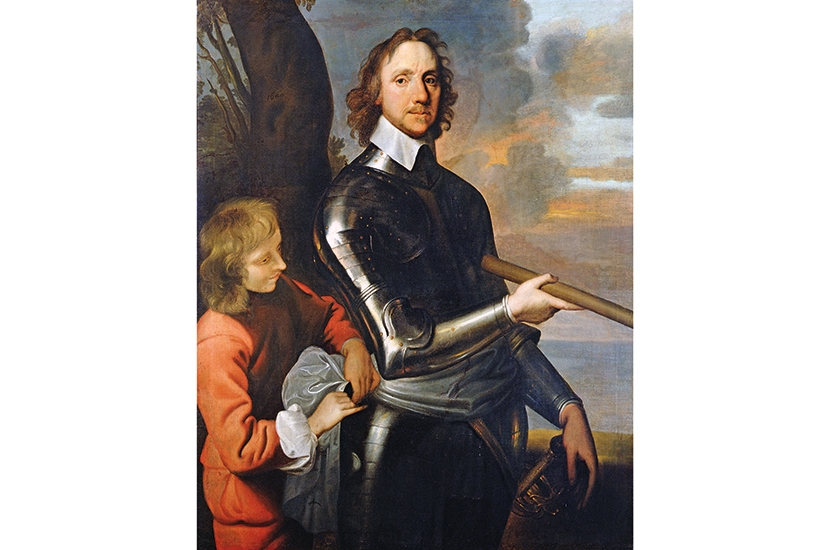One of the first retrospective accounts of Oliver Cromwell’s early career, Andrew Marvell’s ‘An Horatian Ode upon Cromwell’s Return from Ireland’ (1650), maintained that its subject was difficult to capture. Perhaps the finest political poem in the English language, it was written shortly after Cromwell’s return from a brutally successful military campaign overseas, which witnessed infamous atrocities at Drogheda and Wexford. It celebrates Cromwell as a victorious military commander, a supernatural epic hero who burns through the air, destroying all who block his path to establishing England as the greatest nation on Earth.
But for all its praise and hyperbole, the abiding impression of the poem is that there is something elusive, frightening and disquietingly off about Cromwell. Not the least of this is his sudden emergence from rural obscurity in East Anglia, from his ‘private gardens, where/ He lived reserved and austere’, through bloody civil war and on to the international political stage. Marvell captured the breathtaking rapidity and violence of this rise in an image of Cromwell as an electrical storm:
And like the three-forked lightning, first Breaking through the clouds where it was nursed, Did through his own side His fiery way divide.
It’s impossible to determine whether those lines are, finally, celebration or warning; they’re delicately, evasively both, and Marvell’s unusual use of those longer and shorter couplets, alternating tetrameter and trimeter throughout the poem, suggests that there’s no single expected pattern that Cromwell conforms to, but only differing ways of reading him. He is at once awe-inspiring and terrifying, spectacular and divisive.
Ronald Hutton’s excellent new biography also charts Cromwell’s movement from obscurity to early celebrity, and echoes Marvell’s assessment of him as ambiguity or paradox. The book is the first instalment of a multi-volume study; it ends in 1647, shortly after parliamentary forces had defeated the royalist supporters of Charles I in the English Civil War. While it unearths nothing new about Cromwell’s early life, it succeeds by eschewing the totalising explanations of other biographers’ accounts that would present Cromwell either as a devout Puritan whose sole purpose was to make the world a better place for the godly, or as a psychopathic regicide and genocidal Machiavel.
Hutton’s Cromwell is, instead, by turns profoundly religious, charismatic, pragmatic, irascible, violent and devious, a man whose rise to prominence came primarily because of his skills as a soldier, as a military strategist and leader of cavalry in battle. Thus, Hutton shows the excessive cruelty of some of Cromwell’s military victories early in his career, when he was still a rookie cavalry colonel in the Earl of Manchester’s army, the Eastern Association. In May 1643 he was involved in the execution of around 100 fleeing royalists at the battle of Belton, Lincolnshire, seemingly exulting in the massacre of enemy countrymen. By the time he joined the New Model Army in 1645, perhaps influenced by its commander Sir Thomas Fairfax, he had learned that it was possible to moderate such behaviour, and could see the political value of clemency.
The flip side of Cromwell’s bellicosity, complicating any image of him as simply a ruthless killing machine, was his care for the soldiers under his command, regardless of their rank: he took pains to ensure that, unlike many of their contemporaries in other regiments, they were all properly paid and regularly supplied. His bond with his men was religious as well as comradely, since he gathered or attracted combatants who were radical nonconformists or religious independents. Even though he publicly claimed that his regiments were relatively inclusive and non-denominational, they were largely populated by men of a similar religious outlook, who saw themselves as agents in God’s holy war. So passionate was Cromwell’s puritanism, even by 17th-century standards, that Hutton dubs him ‘a puritan jihadi’. That assessment might not do much to endear his subject to the broadest possible contemporary readership.
As a military history of the English Civil War in which Cromwell is centred, this book is unlikely to be surpassed. Hutton is brilliant at grounding the rather abstract business of cavalry and infantry formations and broader military tactics in the sensory experience of the natural world on the battlefield. The blooming and fading of hedgerows and the growth and fall of crops and grass had a profound impact on where soldiers and their horses might camp, and how they regarded the prospect of imminent bloodshed and death.
Hutton’s account of the greatest battle of the conflict, Marston Moor, on 2 July 1644, in which Cromwell surveyed the two-and-a-half-mile battlefront from his position in the left cavalry wing, is alive to the sounds and smells of the encounter: the stench of dung, sweat, sulphur and urine was overpowering. The evocation of this scene is enriched by the observation that powder smoke is also a powerful laxative, the source of the civil war re-enactor’s adage: ‘Never follow a gunner into a portaloo.’
As a more traditional biography, however, in which one might expect the unfolding of a consciousness, the charting of an inner world or the exploration of a subject’s private perspectives unavailable to many contemporaries, Hutton’s study falls slightly flat. This is partly because of the paucity of the historical record for the first 40 years of Cromwell’s life. Had he died relatively young, as far as history is concerned it would have seemed as if he had barely existed, such is his invisibility in the archive and record office.
But once Cromwell began his military career, he wrote lots of letters — familial and intimate, professional and official — which do survive. Hutton quotes rather sparingly from these, preferring paraphrase and short quotation, which keeps Cromwell at arm’s length when compared with some of his other biographers. Still, as an account of Cromwell’s experiences of the English Civil War, this is a rich and immensely enjoyable book, and Hutton’s expert, sceptical eye ensures that the manifold contradictions and paradoxes of its subject are always kept in view.






Comments